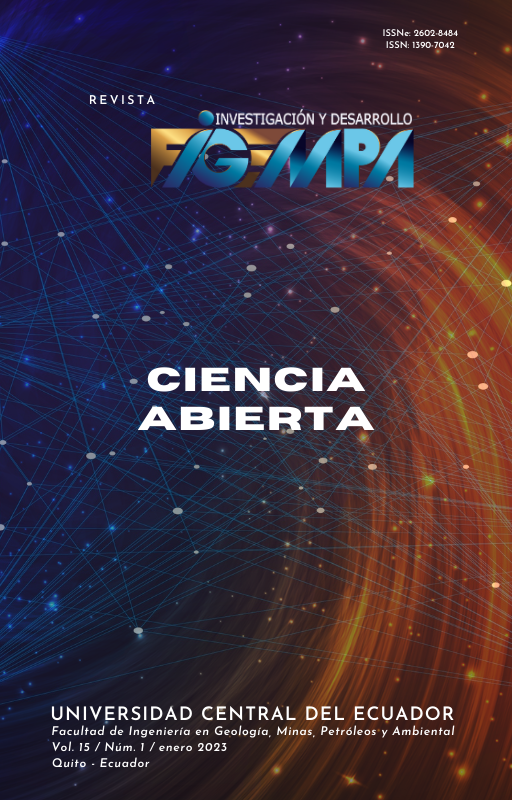Diagnosis of food waste in the province of Cotopaxi, José Guango Bajo parish, food bank proposal
Main Article Content
Abstract
The present investigation was carried out in the Latacunga canton, José Guango Bajo Parish, Barrio Centro, with the objective of carrying out an analysis of the food waste that occurs in the area to design the implementation proposal of the UTC Food Bank. The methodology of the kobotoolbox tool was used, which allowed the results of the survey to be collected. Strategic random sampling was applied for the application of 2,481 surveys distributed as follows; it was applied to 700 agricultural producers, 860 to consumers and 921 to marketers. This study focuses on the context of waste. The results detail the lack of regulations and inconveniences derived from the composition of the system, in the same way the surveys report that the majority of people waste food, 30% in homes, 25% commercialization, 25% storage while in the distribution of food 20%. 80% of those surveyed affirm that the proposal of the UTC Food Bank for the city of Latacunga would be a good initiative, which would benefit vulnerable people in the sector.
Downloads
Metrics
Article Details

This work is licensed under a Creative Commons Attribution 4.0 International License.
References
Alexander, P., Brown, C., Arneth, A., Finnigan, J., Moran, D. & Rounsevell, M. (2017) Losses, inefficiencies and waste in the global food system.
Banco Mundial (2019) Agricultura y alimentos. 24 de agosto de 2019. Obtenido de Banco Mundial.
Basso, N., Brkic, M., Moreno, C., Pouiller, P. & Romero, A. (2016) Valoremos los alimentos, evitemos pérdidas y desperdicios. Recuperado el 15 de febrero de 2019. http://www.scielo.org.ar/scielo.php?script=sci_arttext&pid=S1852-73372016000200004&Ing=es
Eguillor, P. (2017) Pérdida y desperdicios de alimentos. Recuperado el 13 de diciembre de 2018. https://www.odepa.gob.cl/wpcontent/uploads/2017/12/residuosFinal-1.pdf
FAO. (2015a) Desperdicio de alimentos.
FAO. (2015b) Iniciativa mundial sobre la reducción de la pérdida y el desperdicio de alimentos.
FAO. (2015c) Pérdidas y Desperdicios de Alimentos en América Latina y el Caribe. Abril de 2015
FAO. (2018) Género y pérdida de alimentos en cadenas de valor alimentarias sostenibles. http://www.fao.org/3/I8620ES/i8620es.pdf
FAO. (2018b). The State of Food Security and Nutrition in the World 2018 – Building climate resilience for food security and nutrition [Internet] FAO, IFAD, UNICEF, WFP, WHO. Roma: Food and Agriculture
FAO. (2019). Un millón de toneladas de alimentos se pierden en Ecuador y buscan evitarlo. EXPRESO
Gascón, J. (2019) Comida no comida. Un análisis del desperdicio de alimentos desde la agroecología. Polisemias de la alimentación, 33.
Gascón, J. & Montagut, X. (2014) Alimentos desperdiciados. Un análisis del derroche alimentario desde la soberanía alimentaria.
Gra, L., Kitinoja, L. & IICA, S. (2016) Metodología de evaluación de cadenas agroalimentarias para la identificación de problemas y proyectos un primer paso para la disminución de pérdida de alimentos.
Gustavsson, J., Cederberg, C. & Sonesson, U. (2011) Global food losses and food waste -Extent, causes and prevention. http://www.fao.org/fileadmin/user_upload/suistainability/pdf/Global_Food_Losses_
HLPE. (2014) A report by The High Level Panel of Experts on Food Security and Nutrition. Obtenido de Food losses and waste in the context of sustainable food systems. http://www.fao.org/3/a-i3901e.pdf
INEC & MAG. (2018) Cifras agroproductivas. Obtenido de Ministerio de Agricultura y Ganadería.

